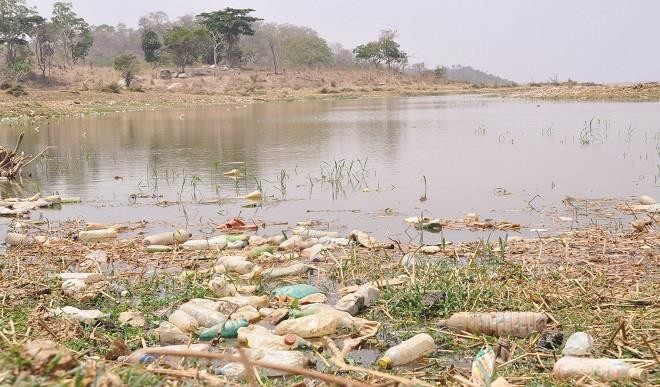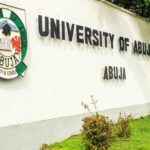
The Lower Usuma Dam, from where Abuja, Nigeria’s capital gets its water, might be a good place to get plastic wastes, and other recyclables due to the extent of pollutants that get into the dam from its catchment areas.
The FCT Water Board director, Hudu Bello, said the doors of the dam were always open to scavengers as the board tries to find alternative ways of clearing the large amount of waste at the dam.
The dam is, among others, a potent source of medical wastes like syringes, needles, drugs bottles while children’s diaper, used slippers and sanitary pads could be among the waste lying to be washed into the dam as soon as the rain comes.
“We do go up to collect the waste but now the scavengers are helping us, we open our doors to them,” he said, though he quickly adds that the waste did not affect the water quality.
A position opposed by a source close to the board who said; “The clarity of water is deceptive, what you can’t see is what should be considered and quality extends beyond having clean water.”
While the search for safe drinking water is crucial to the authorities of the water board, the load of waste that makes its way into surface water raises concern.
The saying, water is life, underscores the importance of potable water. But several people throw caution into the wind by picking a cup and drinking from the nearest tap while others just bite into the available sachet or bottled water without ensuring that the water is safe, just as long their thirst is quenched.
This action has led to several water-borne diseases which, according to the United Nations International Children’s Emergency Fund (UNICEF), caused the deaths of more than 300,000 children under the age of five globally from diarrheal infections.
This raises the question on how safe is the water you drink. In many states, the government is responsible for the provision of safe water for the people, mostly through the water boards or department but studies have shown that in some states, the water supplied by these boards is not safe enough.
Abuja has one of the best treatment plants in the country, the level of pollutants on the surface water at the Lower Usuma Dam raises residents’ suspicion about the quality of water gushing from their taps.
Some experts have raised questions about the long term effects of herbicides, pesticides, medical wastes, used toiletries and other items that find their way into the dam through several activities at the catchment areas.
The Director of FCT Water Board, Hudu Bello, however allayed residents’ fears adding that the water treatment plant was designed to address those challenges.
Abuja’s Lower Usuma Dam generates water to several districts and communities and should the planned developmental phases be achieved, more than half of the entire Abuja population could be getting water from the Federal Capital Territory Water Board. Presently, though, there are more than 663 million people living without safe water.
As the world marks the World Water Day today with the focus on taking action to tackle water crisis, these 663 million people spend countless hours queuing or trekking to distant sources and coping with the health impacts of using contaminated water.
But those that have access to water also face the danger of drinking contaminated water, mostly from poor treatment at the water treatment plants or contamination that occurs along the pipelines.
Haruna Abukakar (not real name) resides in Garki and for more than four years, he has not taken the water from the Water Board “because he believes bottled water is safer.”
There are several residents like Abubakar who only use water from the board for domestic chores, though he admitted not contracting any illness since he has been taking the water.
“When you come to the dam, you will be scared about the water you drink,” the source close to the FCT Water Board who pleaded anonymity told Daily Trust.
The source who clhan 20 years, said the water treatment plant was not constructed to address the present extent of pollutants at the dam.
“At the construction stage of the dam, we never envisaged such a situation, hence the issue of farming was completely ruled out in the catchment area. Now we have new unexpected parameters which are entering the dam and the system on the ground that it is not designed to take care of this,” the source said, adding that the treatment plant needs to be redesigned “if we want to save the lives of Nigerians.”
A claim the FCT Water Board debunked: “It is true that they are coming but it has nothing to do with the quality of our water. It is still six times better than recycled water.
“I challenge anybody to come and dispute my claim that our water is the best. It is analyzed by the Federal Ministry of Water Resources, National Food and Drugs Administration and Control (NAFDAC) and Standards Organization of Nigeria (SON).”
He said the companies that designed the plants envisaged such a situation hence the installation of a potassium permanganate valve. “They indicated that about 40 years from the installation day, the level of organic matter will be so high, so what we do is to decompose all the organic matter with potassium permanganate.”
The source also said most of the pollutants come from Mpape, an urban slum. He said residents in the community have turned the dam into a dumping ground.
He said the huge amount of waste from the community covered the body of water at the dam during the rainy season. “When the rainy season comes, you will be sorry you are drinking from the dam. You will not be able to see the body of the water because it will be covered by this mess.”
An argument, the FCT Water Board confirmed: “If we say they should raise an alarm that the settlement in Mpape is a threat to the dam, I agree with them because Usuma Dam is located at the lower part of Mpape, and large quantity of waste comes from there. There is nothing we can do about that. We can only ensure something is done about the treatment to ensure good quality.”
The source said the solid particles and soluble waste were treated with appropriate chemicals to ensure that the water is safe for drinking. “I depend 100 percent on our treatment water and has been doing that for 32 years and 10 days.”
He said anyone that saw the level of pollutants going into the dam would appreciate the need for chemicals.
While the debris on the surface posed a challenge, the prevalence of farming activities, bush burning and tree felling in the catchment areas portends greater danger to water treatment.
“The catchment areas should be uninhabited and free from activities. Farming activities will increase herbicides and pesticides getting into the water which is dangerous; we have to revisit it if we really want to save the lives of the residents,” the source said.
Daily Trust observed that most trees at the catchment areas have been felled while several were burnt probably for charcoal. Some farmers have also taken advantage of the river bank to engage in farming.
Experts said farming activities at the catchment areas allowed water to wash away the soil top layers into the dam thereby causing the dam to become filled with silt.
“As it is now, the catchment area is very large, the body charged with securing the place is the Abuja Environmental Protection Board (AEPB); if they don’t protect us the consequence is on us,” Bello said.
He, however, said the FCT Water Board educates the farmers not to use insecticides “and they have been adjusting as most of them now use organic fertilizer which is biodegradable.”
On the way out, the source said a new study has to be carried out on the water treatment plant and its redesigning which would not involve the outright removal of the structure.
The director would prefer trees and Bermuda grass to be planted at the catchment area so that the wastes would be trapped and evacuated without getting into the dam.
The Acting Director of the Abuja Environmental Protection Board (AEPB), Mrs. Omolola Olanipekun, said the board has not been informed about the encroachment into the dam’s catchment area by farmers and tree fellers.
Mrs. Olanipekun, who spoke through the board’s public relations officer, Ibrahim Muktar, also said FCT Water Board did not inform the board about such activities.
“In that case this is just good information for us, we will investigate it and ensure that necessary action is taken,” he had said when our reporter told him about the dangers of farming activities and tree felling at the catchment area.

 Join Daily Trust WhatsApp Community For Quick Access To News and Happenings Around You.
Join Daily Trust WhatsApp Community For Quick Access To News and Happenings Around You.


